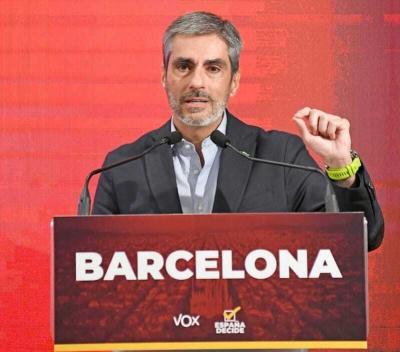Spain: Election pre-campaign, hate and Agenda 2030
With one month to go before the next regional and local elections in Spain, the political parties have begun the electoral pre-campaign, with events and rallies becoming more and more frequent. On the left, the big questions are: the erosion of the Socialist Party; the effect of the emergence of Sumar, led by the communist labour minister Yolanda Díaz; and the very possible collapse of Podemos. On the right, the questions are what the model of relations between the Popular Party and VOX will be, and the growth of Santiago Abascal’s party. Will there be more pacts like the one in Castilla y León, or will the PP be willing to make a pact with the Socialists?
Within the left, the isolation of Podemos, responsible for devising some of the most radical laws of the current government, is striking. The Socialists, without whom these laws could not have been passed, are now distancing themselves from their government partners and, on the other hand, a new split called Sumar threatens to sink their electoral prospects (to the point that they want to form an electoral coalition with their split). Podemos suffered a defeat in Parliament at the hands of its government partners with the approval of a series of changes to the “only yes is yes” law to stop the reduction of sentences for sex offenders (more than a thousand have benefited from this law). The Popular Party supported the PSOE’s reform with loud applause and even spoke of a “repeal” thanks to the changes. Its spokesman, Borja Sémper, declared that the PP would maintain the law once in government. Here it is important to note that this law, after correcting its most immediate negative effects, is yet another initiative of the radical left approved by the “moderate” parties. VOX, whose amendments were rejected, decided not to participate in the vote. The MP Carla Toscano stated that “with this reform, which maintains the violation of fundamental rights, the violation of the presumption of innocence, of basic freedoms and of equality before the law, women will no longer be protected”. And that this law, like many other feminist laws, is “one more tool of the left to divide men and women”.
Where Podemos did have the support of the PSOE was in the new Housing Law, a law that was passed thanks to the votes of the separatist parties and which had been at a standstill for more than a year. This law, which limits rents and makes evictions more difficult, has been denounced by police unions because it favours squatting, a real plague in some parts of Spain. In contrast, the government of Castilla y León, formed by the Partido Popular and VOX, approved a measure to evict squatters within 48 hours. Despite the difficulties on the part of the PP to fulfil some of the agreements with VOX, the government of Castilla y León is for many an example of what a future government of Spain could be.
Unearthing hatreds
“If only mine were the last Spanish blood to be shed in civil discord. Would that the Spanish people, so rich in good and endearing qualities, could now find in peace Homeland, Bread and Justice”. This was the testament of José Antonio Primo de Rivera, founder of the Falange, who was assassinated by the Popular Front on 20 November 1936. Today, 86 years later, a government that proudly claims to be the heir of the Popular Front of socialists, communists and separatists has forced José Antonio’s family to remove him from his grave in the Valley of the Fallen. It is yet another example of historical revanchism and of how the left wants to dig up hatreds from the past to set the Spaniards against each other. Some even want to destroy the Cross, the largest in the world, in their eagerness to rewrite history. Sadly, this unfortunate event could have been avoided if the Government of the Community of Madrid, led by the popular Isabel Díaz Ayuso, had agreed to convert the valley into an asset of cultural interest. However, following the usual policy of not fighting the ideological postulates of the left, the response of the Popular Party was, on the one hand, to declare that this was outside the scope of its competences, which was a lie, and, on the other, to say that they were concerned about more important matters. Equally regrettable was the response of the Episcopal Conference, whose spokesman César García Magán, like Pontius Pilate, said that he had “nothing to say” about the exhumation of José Antonio Primo de Rivera or the continuity of the Benedictines in the Valley of the Fallen. It seems that everyone forgets that the future cannot be built without defending the past, and even less so without respecting its dead.
Agenda 2030 and May 1st
On the occasion of 1 May, Solidaridad, the trade union linked to VOX, unfurled a huge banner in Madrid calling for the demonstration and denouncing Agenda 2030. On the banner, PP MEP José Manuel García-Margallo, a politician who has defined the 2030 Agenda as the “gospel”, acts as a globalist priest and marries the president of the government, Pedro Sánchez, to his second vice-president, Yolanda Díaz. The guests at the Agenda 2030 wedding include communists, pro-independence supporters, leaders of the Sao Paulo Forum, such as Evo Morales and Lula de Silva, as well as prominent members of the Popular Party, such as Alberto Núñez Feijóo and Isabel Díaz Ayuso. The PP has unsuccessfully requested the withdrawal of the poster for portraying its leaders with the entire left and extreme left, but the truth is that they all share their enthusiasm for the 2030 Agenda which, by the way, has been introduced in Spain by the PP. This is one of the major stumbling blocks to collaboration between the two parties, since VOX is radically opposed to Agenda 2030. Santiago Abascal has stated that if any VOX member speaks out in favour of the 2030 Agenda, he or she will be expelled from the party immediately: “We are very clear about this. For us, Agenda 2030 is hell. It is hell for the middle classes, for our agriculture, for our industry. It is hell for our nation”.
Portugal: “Lula, thief, you belong in prison”.
The TAP corruption scandal is still very topical, despite the fact that the commission of enquiry is still in its initial phase. However, statements by the CEO dismissed by the government, Christine Ourmières-Widener, and Alexandra Reis, former director of the airline, point to a network between the government, the Socialist Party and TAP’s board of directors. Even the Presidency of the Republic had to clarify in a written statement that they had never contacted TAP, or any member of the government, about a flight from Mozambique in March 2022, cited in several emails investigated by the parliamentary committee. According to what was read in the committee, the former Secretary of State for Infrastructures, Hugo Mendes, argued that it was important to keep the President of the Republic, Marcelo Rebelo de Sousa, as an ally of TAP. As a result of this and other information, the president of CHEGA, André Ventura, announced the initiation of a popular action against the state before the Supreme Administrative Court for the “absolutely illegal and immoral compensation” paid by TAP.
In addition to this issue, Marcelo Rebelo de Sousa was in the news for vetoing for the fourth time the parliamentary law approved by the left to decriminalise euthanasia, asking Parliament to clarify two points of the new law: "Who defines the physical incapacity of the patient to self-administer lethal drugs, as well as who must guarantee medical supervision during the act of medically assisted death". Once again, Rebelo de Sousa stands firm against the ideological dogmas put forward by the left. However, the same cannot be said of the largest opposition party, the PSD popular party, which, in agreement with the parties of the left, welcomed Lula da Silva's visit to Portugal, although they stated that the solemn session should not be held during the 25 April celebrations because, in the words of their parliamentary leader, Joaquim Miranda Sarmento, Brazil's president "deserves the dignity of having his own day". Curiously, the same thing happened in Spain with the visit of the former guerrilla Gustavo Petro, president of Colombia, at the beginning of May. Despite often criticising Spain for the conquest of the Americas and supporting Catalan separatists, Petro received a standing ovation from all parties in Parliament, except for the VOX deputies who left the chamber. He was decorated with the Order of Isabel la Católica and received the golden key to Madrid from the city mayor, José Luis Martínez Almeida of the Partido Popular.
Lula's visit to Portugal was further complicated by the Brazilian president's statements in Beijing, in which he took up the Russian thesis and accused the United States of 'encouraging war'. For this reason, Ukrainian associations in Portugal protested against his visit, but it was CHEGA, in an event that brought together some 2,000 people, that staged the rejection of Lula da Silva's presence in the Portuguese Parliament. Under the slogans, "Lula, thief, your place is in prison", and "Zero tolerance for corruption", and with numerous flags from Portugal, Brazil and even Ukraine, the demonstration passed off without incident.
Read also
The Banned Writers of the Slovo House
The Holodomor is a genocide that has become better known as a result of the Russian invasion of Ukraine, but when the crime was committed almost a century ago, the world did not know or did not want to know, and only a few voices, such as the journalist Gareth Jones or the Austrian engineer Alexander Wienerberger, dared to denounce the barbarity committed by Stalin.
Álvaro Peñas
“The West dropped its guard and was slow to recognise the emergence of a new, revanchist dictator in Russia”: An Interview with Geoffrey van Orden
Geoffrey Van Orden is a former British army brigadier-general who subsequently spent 20 years as a Member of the European Parliament.
Álvaro Peñas
Growing problems for the Soviet Federation
In a message on social media, Donald Trump claimed that Russia’s economy is crumbling and that he would do it the favour of allowing it to end a “stupid” war that should not have started.
Álvaro Peñas
Gonzalo de Oro: "If VOX does not defend the Catalans, no one else will"
Interview with Gonzalo de Oro, VOX councillor in Barcelona City Council and coordinator of the VOX municipal group.














Comments (0)